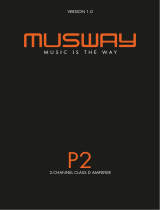
THE PURCHASED DEVICE IS ONLY SUITABLE FOR AN OPER-
ATION WITH A 12V ON-BOARD ELECTRICAL SYSTEM OF A
VEHICLE. Otherwise fire hazard, risk of injury and electric shock
consists.
PLEASE DO NOT MAKE ANY OPERATION OF THE SOUND-
SYSTEM, WHICH DISTRACT YOU FROM A SAFE DRIVING.
Do not make any procedures, which demand a longer attention.
Perform these operations not until you have stopped the vehicle
on a safe place. Otherwise the risk of accident consists.
ADJUST THE SOUND VOLUME TO AN APPROPRIATE LEVEL,
THAT YOU ARE STILL ABLE TO HEAR EXTERIOR NOISES
WHILE DRIVING. High performance sound systems in vehicles
may generate the acoustic pressure of a live concert. The perma-
nent listening to extrem loud music may cause the loss of your
hearing abilities. The hearing of extreme loud music while driving
may derogate your cognition of warning signals in the traffic. In
the interests of the common safeness, we suggest to drive with
a lower sound volume. Otherwise the risk of accident consists.
DO NOT COVER COOLING VENTS AND HEATSINKS. Otherwise
this may cause heat accumulation in the device and fire hazard
consists.
DO NOT OPEN THE DEVICE. Otherwise fire hazard, risk of injury
and electric shock consists. Also this may cause a loss of the
warranty.
REPLACE FUSES ONLY WITH FUSE WITH THE SAME RA-
TING. Otherwise fire hazard and risk of electric shock consists.
DO NOT USE THE DEVICE ANY LONGER, IF A MALFUNCTION,
WHICH REMAINS UNREMEDIED. Attend in this case the chapter
TROUBLE SHOOTING. Otherwise risk of injury and the damage
of the device consists. Commit the device to an authorized retailer.
THE INSTALLATION OF A POWER CAPACITOR WITH SUF-
FICIENT CAPACITY IS RECOMMENDED. High performance
amplifiers cause high potential voltage drops and need a high
power consumption at a high volume level. To relieve the vehicle’s
on-board system, it is recommended to install a power capacitor
between the battery and the device which works as buffer. Consult
your car audio retailer for the appropriate capacity.
INTERCONNECTION AND INSTALLATION SHOULD BE AC-
COMPLISHED BY SKILLED STAFF ONLY. The interconnection
and installation of this device demands technical aptitude and
experience. For your own safness, commit the interconnexion
and installation to your car audio retailer, where you have purchased
the device.
DISCONNECT THE GROUND CONNECTION FROM THE
VEHICLE’S BATTERY BEFORE INSTALLATION. Before you
start with the installation of the sound system, disconnect by any
means the ground supply wire from the battery, to avoid any risk
of electric shock and short circuits.
CHOOSE A APPROPRIATE LOCATION FOR THE INSTALLA-
TION OF THE DEVICE. Look for a appropriate location for the
device, which ensures a sufficient air circulation. The best places
are spare wheel cavities, and open spaces in the trunk area. Less
suitable are storage spaces behind the side coverings or under
the car seats.
DO NOT INSTALL THE DEVICE AT LOCATIONS, WHERE IT
WILL BE EXPOSED TO HIGH HUMIDITY AND DUST. Install
the device at a location, where it will be protected from high
humidity and dust. If humidity and dust attain inside the device,
malfunctions may be caused.
ENG|SAFETY INSTRUCTIONS
14
PLEASE CHECK THE FOLLOWING ADVICES BEFORE THE FIRST OPERATION!
ENSURE THAT THE LOUDSPEAKER CABLES HAVE NO
CONTACT WITH THE VEHICLE’S CHASSIS/GROUND. Other-
wise serious damages on the components and the electrical
system may occur.
MOUNT THE DEVICE AND OTHER COMPONENTS OF THE
SOUND SYSTEM SUFFICIENTLY. Otherwise the device and
components may get loose and act as dangerous objects, which
could cause serious harm and damages in the passenger room.
DO NOT DAMAGE COMPONENTS, WIRES AND CABLES OF
THE VEHICLE WHEN YOU DRILL THE MOUNTING HOLES. If
you drill the mounting holes for the installation into the vehicle’s
chasis, ensure by any means, not to damage, block or tangent
the fuel pipe, the gas tank, other wires or electrical cables.
ENSURE CORRECT CONNECTION OF ALL TERMINALS. Faulty
connections may could cause fire hazard and lead to damages
of the device.
DO NOT INSTALL AUDIO CABLES AND POWER SUPPLY
WIRES TOGETHER. Attend while installation not to lead the audio
cables between the headunit and the amplifier together with the
power supply wires on the same side of the vehicle. The best is
a areal separated installation in the left and right cable channel
of the vehicle. Therewith a overlap of interferences on the audio
signal will be avoided. This stands also for the equipped bass-
remote wire, which should be installed not together with the power
supply wires, but rather with the audio signal cables.
ENSURE THAT CABLES MAY NOT CAUGHT UP IN CLOSE-
BY OBJECTS. Install all the wires and cables like described on
the following pages, therewith these may not hinder the driver.
Cables and wires which are installed close-by the steering wheel,
gear lever or the brake pedal, may caught up and cause highly
dangerous situations.
DO NOT SPLICE ELECTRICAL WIRES. The electrical wires
should not be bared, to provide power supply to other devices.
Otherwise the load capacity of the wire may get overloaded. Use
therefor a appropriate distribution block. Otherwise fire hazard
and risk of electric shock consists.
DO NOT USE BOLTS AND SCREW NUTS OF THE BRAKE
SYSTEM AS GROUND POINT. Never use for the installation or
the ground point bolts and screw-nuts of the brake system, steering
system or other security-relevant components. Otherwise fire
hazard consists or the driving safety will be derogated.
DO NOT BEND OR SQUEEZE CABLES AND WIRES BY SHARP
OBJECTS. Do not install cables and wires not close-by movable
objects like the seat rail or may be bended or harmed by sharp
and barbed edges. If you lead a wire or cable through the hole
in a metal sheet, protect the insulation with a rubber grommet.
KEEP AWAY SMALL PARTS AND JACKS FROM CHILDREN.
If objects like these will be swallowed, a risk of serious injuries
consists. Consult promtly a medical doctor, if a child swallowed
a small object.













